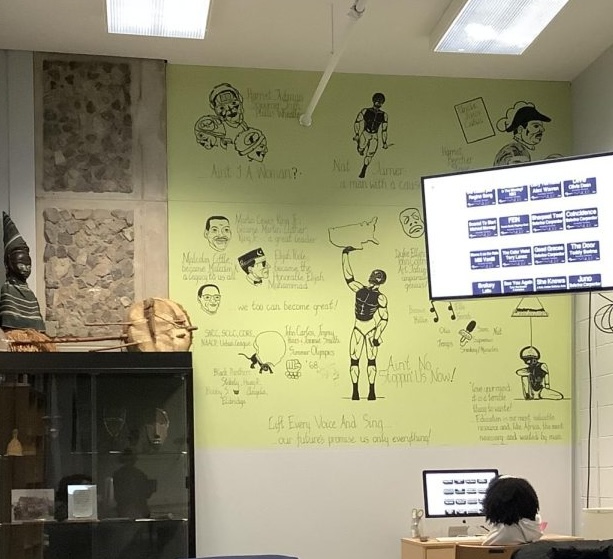“It’s well past time that white people need to start educating themselves on these issues of race and stop looking to our faculty, staff and students of color to do that education for us,” said Samantha Elebiary, director of the BOLD Program, a women’s leadership network at Ithaca College.
In the wake of the killing of George Floyd on Memorial Day, students, staff and faculty at Ithaca College came together during the summer in virtual spaces to reflect and find community. From these spaces came a call to action by students at Ithaca College to have spaces for white-identifying students to talk about racism.
This call to action was one RahK Lash, director of the Center for Inclusion, Diversity, Equity and Social Change (IDEAS), was happy to answer.
“So often when we talk about diversity, equity and inclusion and we talk about issues, we really focus on people of color and say, ‘well that’s a conversation as a white person I can’t have,’ he said. “But no, we need you to have those conversations, so that was our thinking.”
Lash called on Elebiary to create this space for white-identifying students, and with the help of Elyse Nepa, Clery Act and crime prevention coordinator at Ithaca College, the White-Identifying Anti-Racist Workspaces were born.
These workspaces started out as a five-part series in the summer with meetings held once a week. The first meeting drew 19 students and throughout the summer the sessions averaged around 12 students per week. Elebiary and Nepa decided to do a second iteration of the series in the fall to continue to provide opportunities for white-identifying students to learn and grow.
Since the sessions began in the summer, over 100 people have registered to take part. Students have turned out in lower numbers for the fall sessions with weekly meetings averaging a total of three participants. Elebiary attributes this decreased turnout partly to Zoom fatigue.
Nicole Brokaw, a senior writing and cinema and photo dual major, attended the workspaces throughout the summer and said these meetings did a good job of making sure every knowledge level was included.
“We tackled the history of things, we tackled broad concepts, we got to explore personal experiences and why they might contribute to the way that we think,” Brokaw said.

Each meeting focuses on a different topic, ranging from the history of slavery to understanding white fragility. Faculty and staff members from across disciplines take part each week as facilitators.
Nepa explains that before the weekly meetings, resources are emailed out to registrants to review. During the meetings, the participants are divided into breakout rooms with facilitators to talk about the source material and discussion questions relating to the topic. The meetings always end with a food for thought, and participants are emailed a reflection question and survey to take after the meeting is over.
“What we wanted to create with this space was more of a co-curricular experience, so we talk a lot about the importance of community dialogue and breaking down the barriers that exist between students and then faculty and staff,” Elebiary said.
Katelyn Levine, a junior music education major at Ithaca College, is participating in the workspaces this semester to continue to engage with the Ithaca College community while she is home taking a leave of absence.
“It’s just a really good space to have the conversations… I think having them in this kind of workspace, where it’s a safe space, where nothing leaves the workspace and there’s kind of accountability,” Levine said.
Elebiary emphasized this aspect of accountability in the workspaces.
“It’s not about blaming ourselves for being white necessarily, but rather recognizing that in being white there are certain privileges that we have access to and what can we do with those privileges?” she said. “We have to do anti-racist work.”
This sense of accountability and social responsibility was a driving motivator for Brokaw to take part in these workspaces.
“We weren’t putting the burden on someone else,” she said. “We were taking responsibility for our own education.”

Levine said these spaces made her feel more comfortable to ask questions that maybe she wouldn’t bring up if she were in a different situation.
“This is the time to be clumsy,” Lash said. “That’s what these spaces are made for. They aren’t to coddle anybody, we’re not gonna coddle. We’re going to have real conversations and hold folks accountable.”
Lash said there has been some pushback from the Ithaca College community about these workspaces and while he said it can be surprising at times, it shows that people are coming up against something in their lived experience and that is fuel for them to keep doing the work.
Elebiary and Nepa hope to continue these workspaces throughout the Spring semester. In the meantime, they are feeling hopeful that these spaces are providing a launching pad for students to take the knowledge they have learned and continue to actively engage in anti-racist work.
“I feel that it is our responsibility here at Ithaca College to make sure that our students are leaving this institution with the knowledge to forge new pathways for a better and brighter future for everyone,” Nepa said.
For more information on the White-Identifying Anti-Racist Workspaces, click here.






